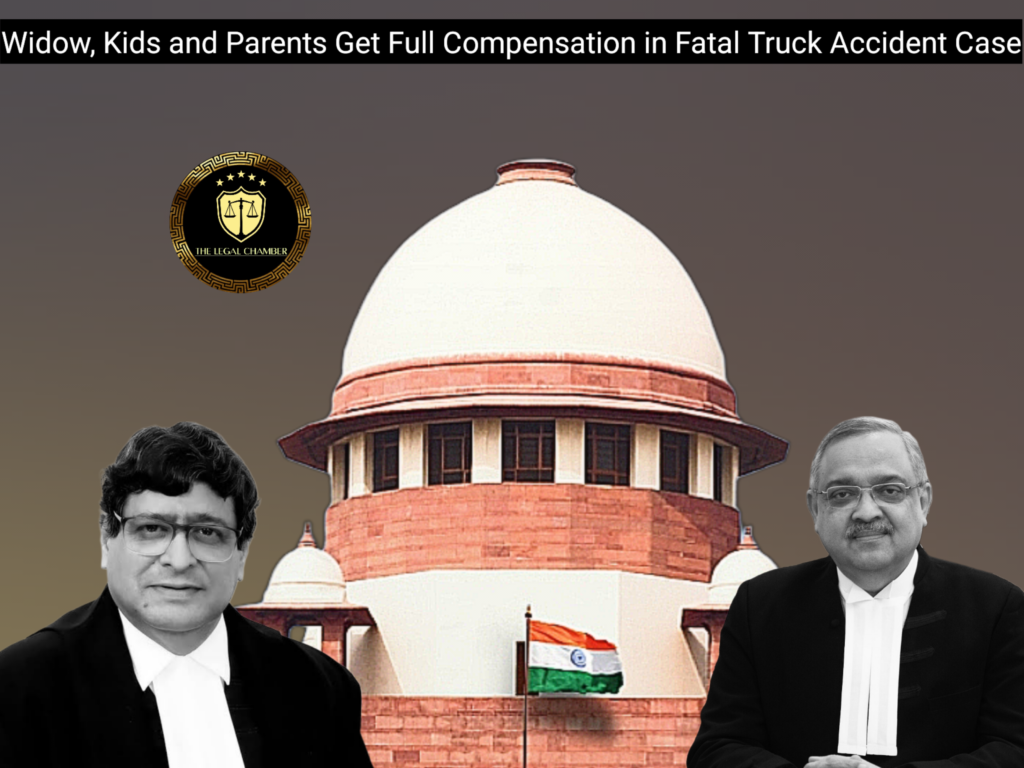
The Supreme Court restored the Tribunal’s compensation award for the family of a deceased truck driver, rejecting the High Court’s reduction of income from ₹10,000 to ₹4,076 per month. Citing Ramachandrappa v. Royal Sundaram Alliance, it upheld ₹10,000 as justified wages for 2014. The Court also affirmed loss of consortium for children and parents under Somwati v. New India Assurance, stressing equitable apportionment. The judgment reinforces fair compensation principles in motor accident claims, emphasizing statutory and precedential rights of dependents.
Facts Of The Case:
The case involved a fatal motor accident where a truck driver, aged 28, was hit and killed by another negligently driven truck while he was boarding his parked vehicle. The deceased’s legal representatives—his widow, three minor children, and parents—filed a claim before the Motor Accidents Claims Tribunal (MACT), seeking compensation for the loss of their sole breadwinner. The Tribunal awarded ₹23.07 lakhs, accepting the deceased’s monthly income as ₹10,000, deducting 1/3rd for personal expenses, and factoring in future prospects. It also granted ₹40,000 for loss of consortium to the widow, ₹25,000 each to the children, ₹10,000 each to the parents, and ₹15,000 each for funeral expenses and loss of estate.
The insurer appealed to the High Court, which slashed the compensation to ₹12.34 lakhs, reducing the income to ₹4,076 (based on minimum wages) and limiting consortium to ₹40,000 only for the widow. In appeal, the Supreme Court overturned the High Court’s order, restoring the Tribunal’s award. It held that the deceased’s income claim was reasonable, citing wage trends from Ramachandrappa, and expanded consortium rights for children and parents per Somwati. The Court directed equal apportionment of the amount, with minors’ shares held in fixed deposits.
Procedural History:
The case originated with a claim petition filed by the legal heirs of the deceased truck driver before the Motor Accidents Claims Tribunal (MACT), which awarded compensation of ₹23.07 lakhs. Dissatisfied, the insurance company appealed to the High Court, which substantially reduced the compensation to ₹12.34 lakhs by revising the income calculation and restricting consortium claims. The claimants then approached the Supreme Court through a special leave petition (SLP No. 10822 of 2021), challenging the High Court’s reduction. The Supreme Court granted leave, heard the appeal (Civil Appeal No. [ ] of 2025), and delivered the judgment, overturning the High Court’s order. It restored the Tribunal’s original award, reaffirming the principles of just compensation and expanding the interpretation of loss of consortium to include children and parents. The Court directed the insurer to deposit the amount within two months, with specific directions for apportionment and management of minors’ shares. The procedural journey thus involved adjudication at three judicial tiers, culminating in the Supreme Court’s authoritative restoration of the Tribunal’s award.
READ ALSO : “Supreme Court Rules on Food Adulteration Cases : Strict Punishment in Food Adulteration Cases
Court Observation:
In its judgment, the Supreme Court made several critical observations while overturning the High Court’s decision. The Court strongly disapproved of the High Court’s reduction of the deceased’s income to minimum wages, noting that judicial notice must be taken of actual earning capacity rather than rigid adherence to wage notifications. Relying on Ramachandrappa v. Royal Sundaram Alliance Insurance Co. Ltd., the Bench emphasized that even an unskilled laborer’s income would have progressively increased to about ₹10,000 per month by 2014, making the Tribunal’s acceptance of this figure justified.
The Court also expanded the scope of compensation for loss of consortium, citing New India Assurance Company v. Somwati, and held that children and parents are equally entitled to such claims, not just the spouse. It criticized the High Court for ignoring this settled legal position. Additionally, the Bench observed that when claimants do not appeal for enhancement, courts should not suo moto reduce justified compensation, as it undermines the beneficial intent of motor accident laws. The judgment reinforced that tribunals must adopt a pragmatic approach in assessing income and compensation, keeping in mind contemporary economic realities and the principle of just restitution for victims’ families.
Final Decision & Judgement:
In its final decision, the Supreme Court allowed the appeal and set aside the High Court’s order, thereby restoring the original compensation awarded by the Motor Accidents Claims Tribunal (MACT). The Court directed the insurance company to pay the full amount of ₹23.07 lakhs to the claimants within two months, along with applicable interest. The compensation was to be equally apportioned among the deceased’s widow, three minor children, and parents, with specific instructions that the minors’ shares be held in fixed deposits until they attain majority, while allowing the mother to withdraw the interest for their welfare. The judgment reaffirmed the principles of just compensation under motor accident laws, emphasizing that courts must adopt a liberal and pragmatic approach while assessing damages. By upholding the Tribunal’s award in its entirety and expanding the recognition of loss of consortium to children and parents, the Supreme Court strengthened the protective framework for accident victims’ families, ensuring comprehensive financial and emotional restitution. The pending applications, if any, were also disposed of accordingly.
Case Details:
Case Title: Hansa Devi & Ors. vs. SBI General Insurance Company Limited & Anr. Citation: 2025 INSC 706 (Non-Reportable) Appeal No.: Special Leave Petition (C) No. 10822 of 2021] Date of Judgment: May 15, 2025 Judges/Justice Name: Hon’ble Mr. Justice K. Vinod Chandran & Hon’ble Mr. Justice Sudhanshu Dhulia
Download The Judgement Here